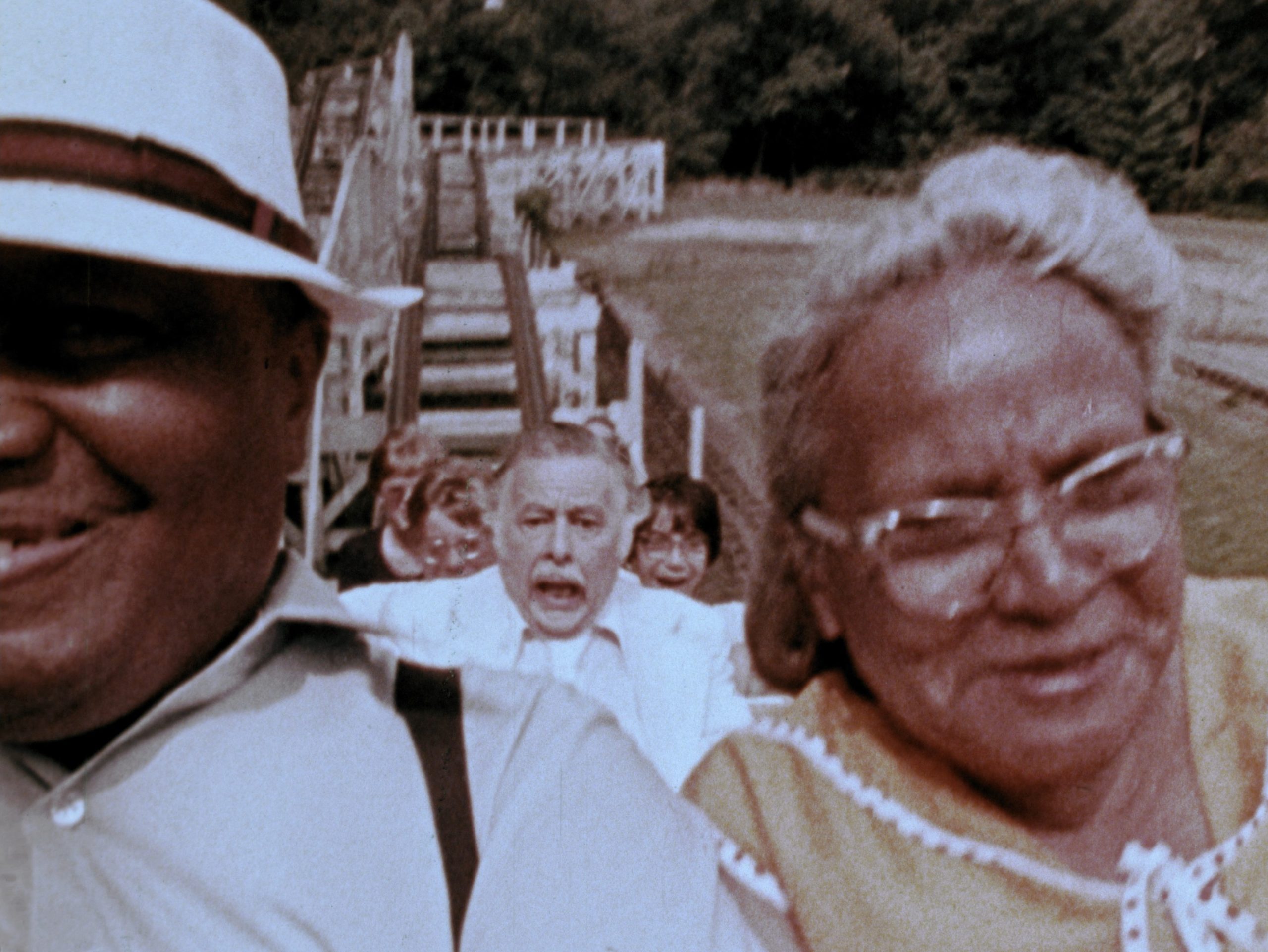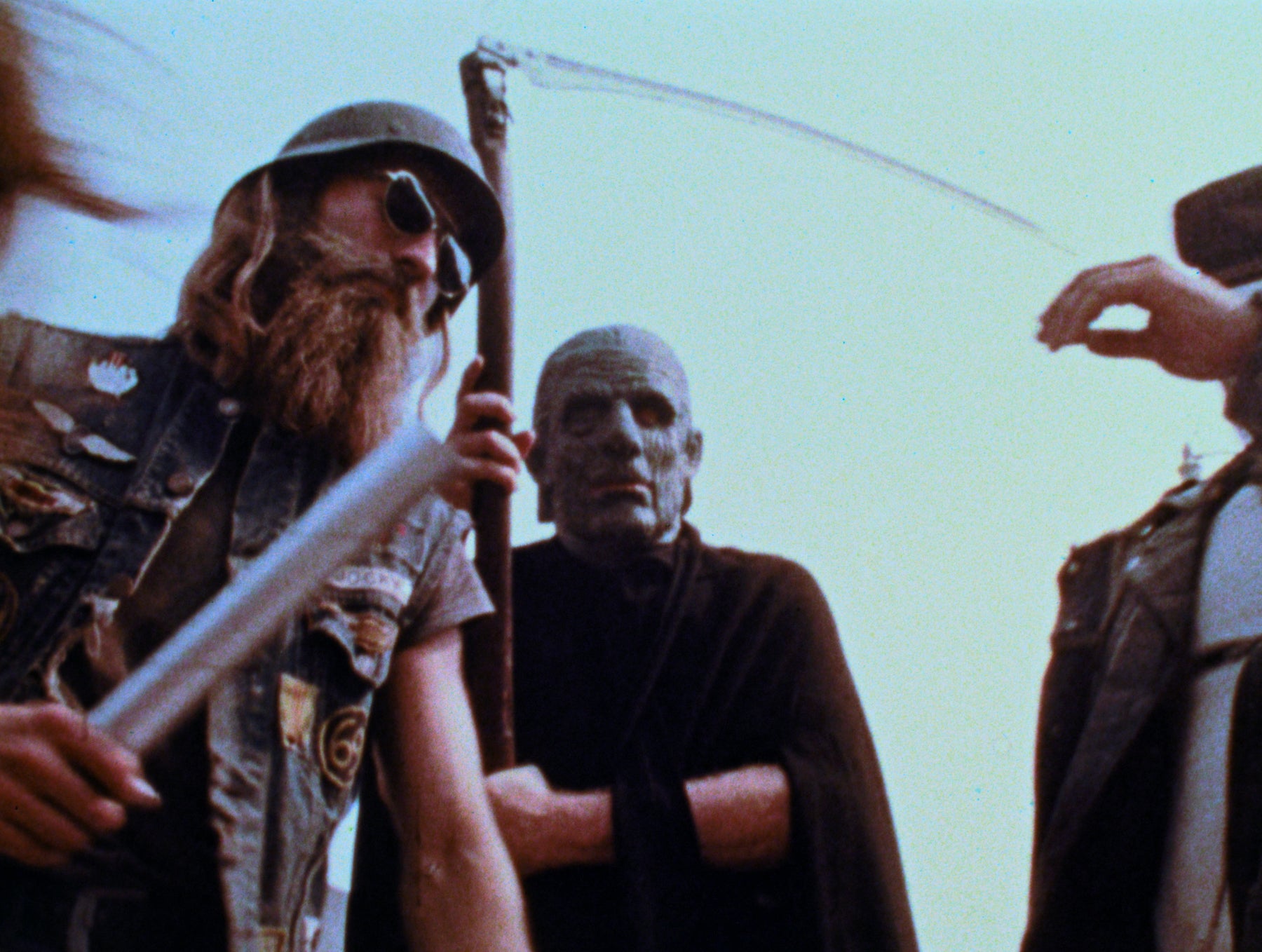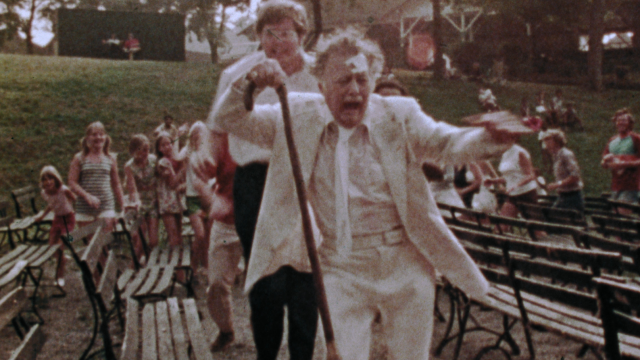Zombie movie king George A. Romero passed away in 2017, but his legacy will live on forever in his work — including, now, an early 1970s “lost” film that’s soon debuting on Shudder. To learn more about The Amusement Park, Gizmodo hopped on a video call with Suzanne Desrocher-Romero, the late filmmaker’s wife.
The Amusement Park was actually a commissioned film on the subject of ageing — and Desrocher-Romero spearheaded the film’s recovery — but it’s not without its Romero-style horrors. It may also come as no surprise that she’s the founder and president of the George A. Romero Foundation. Desrocher-Romero spoke with us about her work and why she was concerned about how fans might react to The Amusement Park. She also gave us an update of sorts on her late husband’s intended final zombie movie, Twilight of the Dead; and her surprising pick for least favourite among his films: “He said to me, ‘Oh my god, Suze, you are the only person, I’ll have you know, that says this.’ And I go, ‘I’m sorry George, but I just don’t love it.’”
Cheryl Eddy, Gizmodo: The Amusement Park is not a typical George Romero film, starting with the fact that it was commissioned by the Lutheran Society. What was its original intention?
Suzanne Desrocher-Romero: It was commissioned by the Lutheran SeniorLife, a precursor to programs like Meals on Wheels, and they wanted to hire a director to shoot something for their community centres to get the word out, to help get support, and all of that. It was his only work-for-hire ever in his whole career, so it really wasn’t meant to be released as a film, per se. It was only in 2017, when a very good friend of ours who was a programmer at the Turin Film Festival gave me this 60mm print and a DVD. I was like “Whoa, what’s this?” And [George] said, “Well, you know, it was a little something I did in ‘73.” So three, four weeks before he passed, we slapped it in the DVD player and we watched it. I’m telling you, it was incredible that a) he never mentioned it, and b) it was just so edgy, and so different, and so harsh, and relevant, and all of those emotions that I was feeling. I said, “Why is it that you never mentioned it?” and he was like, “Suze, it was three days. It was bing, bang, boom. We shot it, it was nothing, it was a commission.”
After he passed… I’m in mourning, I’m wandering the halls, [wondering] what am I gonna do — and slow by slow, inch by inch, forward momentum, we get a 501(c)(3) [nonprofit designation], which is our foundation, and then we decide that this is going to be our first project. We’re going to get this restored, we’re going to get it out there, and we’re going to see if people, Romero completists want to see this film — because I understood that it was very much not like his normal films. It’s quite different. And I was concerned that the zombie fan would not like it. So I did express that concern. But I think that people are understanding that he’s a filmmaker, and that this was an early work, and it’s important that work comes out, and that the message that he has for this film is relevant today — like a lot of his films, it’s still relevant today. The more I see it, the more I realise how important this film is. The message that it evokes — that we dismiss our elderly, especially the ones who have no money, it’s a scary thing, especially with the pandemic when so many of them got wiped out. And the fact that we’re all gonna age, it’s all coming towards us, we need to snap out of it because we’re no exception … It was a powerful moment when I saw it, and I’m glad that it’s out there and I’m glad people are seeing it.

Gizmodo: What did the Lutheran Society think of it?
Desrocher-Romero: They [did] use it initially, but I suspect that they thought it was a little edgier than they would have liked. When I approached them in 2018 to see if they had a print — because the print I had was a mess; it was warped, it was scratched, it was magenta, it was all of it — they had no record of it. They didn’t know they commissioned it, they didn’t have the film, they were like, “Sorry, but we have no idea.” So IndieCollect restored it — for me, that was the easy part, for them it was the hard part because it was just so hard. But once they restored it, my job was just to get all my ducks in a row and see if people were interested in seeing it. As it turns out, they are!
Gizmodo: What’s the fan response been like?
Desrocher-Romero: It’s been very, I would say actually excellent. It’s been really, really awesome. It surprises me because like I said, I knew the cinephiles would like it. I knew that the real Romero fans would like it. I just wasn’t sure how disappointed, and I don’t mean to be dismissive, but just sort of [how disappointed] the zombie fan [would be]. I wasn’t sure if they were going to like it. But I think they do! I think they respect him as a filmmaker.
Gizmodo: As you mentioned, it has some themes and elements that echo Romero’s other works — not just the appearance of a biker gang, though that was delightful to see. When you watch The Amusement Park, what are the Romero trademarks that stand out to you?
Desrocher-Romero: I could see his other films, his future films, in this film. I could see the way he cut the film, the way he shot it. I could see him making sure that the theme was expressed in a storytelling way, and a different way, too — you know, the man in the white room going into the amusement park, where you’re supposed to go for fun. It’s supposed to be a pleasant experience. It’s supposed to be one where you forget your troubles… but as it turns out, it’s not so amusing. It just captures George’s sensibility in every way. I just see him in every inch of that film. Every frame, I see him, I see his work. You know, he didn’t even think he had a particular style, which is crazy — because he totally did. But when you’re the filmmaker, when you’re the artist, you don’t necessarily see your style so much. But I certainly did, and I didn’t even know who he was when I met him. I saw his films three months after we were dating and [had] a Romero film festival in my apartment, sitting next to him watching all of his movies. I can’t tell you how many people are envious of this position I was in. But I could just see this film being more Romero than a lot of his other films, to be honest. It was really Romero-like in almost every way.

Gizmodo: I was going to ask if you were a horror fan before you met him, but it sounds like… maybe not.
Desrocher-Romero: Not so much, no. I’m more Shakespeare and, you know, Louisa May Alcott. I’m sort of girly-girl in that way. Actually, he thought I was quite deprived in terms of my cinema knowledge, so I went to school [laughs]. For 12 years, he showed me every important film, and I’ve seen them all. I wouldn’t say I’m a cinephile but I have come a long way, definitely.
Gizmodo: Do you have a favourite among his films?
Desrocher-Romero: I really love Survival of the Dead. My second favourite is Day of the Dead. Then I would go with Night [of the Living Dead]. And my least favourite is Dawn [of the Dead].
Gizmodo: Whoa! Why is that?
Desrocher-Romero: I don’t know. I find it cheesy! He said to me, “Oh my god, Suze, you are the only person, I’ll have you know, that says this.” And I go, “I’m sorry George, but I just don’t love it.” And he’d go, “Well, you’re the only one.” And I still, even to this day, my team at the [George A. Romero Foundation] will say, “Whoa, whoa, whoa. Dawn of the Dead is like, the iconic film,” and I’m like, “OK, well, whatever.” So it’s my least favourite. I find Creepshow fun. Really like Martin, it’s intriguing. But Survival, I really think is underrated and undervalued. I just don’t get why people don’t love that movie. I think it’s extraordinary. I love it.
Gizmodo: Any updates on Twilight of the Dead?
Desrocher-Romero: Well, [the script is] in my drawer. It won’t leave my drawer until there’s a solid team that I feel comfortable with. I’m holding it very tight to my vest because I’m concerned it’ll be exploited. I’d like to keep my sovereignty with this project — it’s his last chapter and I want to make sure it’s done correctly. It’s nothing until it’s something, and I’m just not prepared to sell my soul for it, so it’ll stay tucked away until the right team comes along.
Gizmodo: What qualities would an ideal team have that would make you say yes?
Desrocher-Romero: I think we need a pretty strong executive producer, for sure. I think we probably need a director — maybe not a famous director, but someone who’s coming [up], who has the sensibilities but yet who will respect Romero but obviously it’s not Romero. Obviously, my dream would be to have it be directed by George, but that can’t happen. So it’s going to be interesting to see what happens. I did want to let people know that it existed, but as far as a plan, it’s gonna be in my drawer until somebody says “Trust me, I will do the right thing.” I’m very protective so I will make sure that it’s done right.
The Amusement Park arrives June 8 on Shudder.
